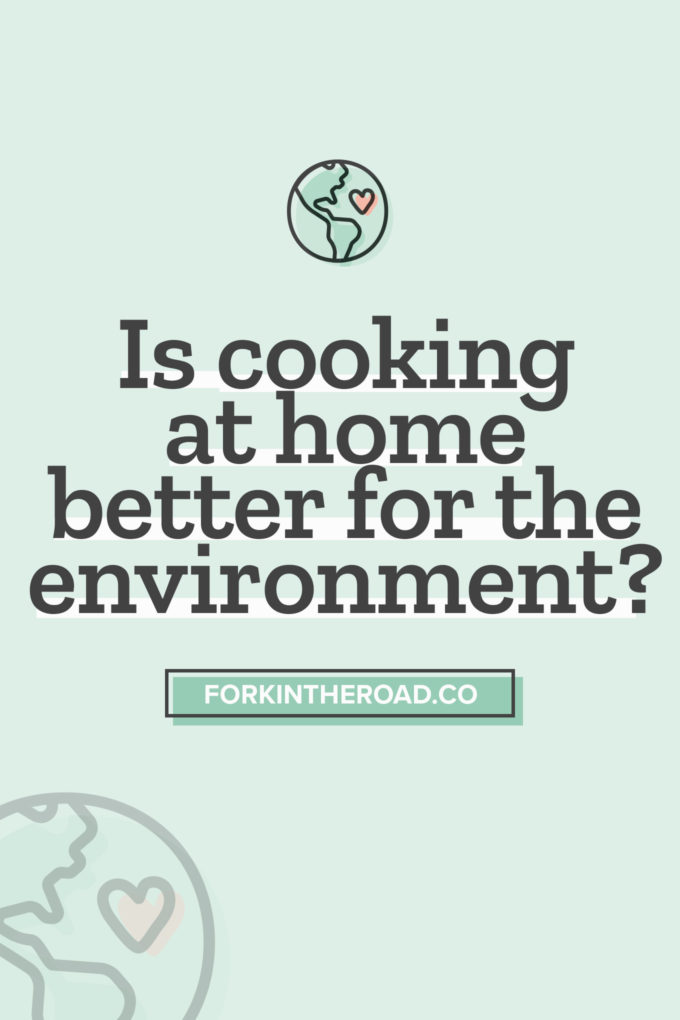Is Cooking at Home Better for the Environment?
Is cooking at home more sustainable than eating out? From ingredients to energy to food waste, we explore whether home-cooked meals are more eco-friendly than eating out.

Want to Save This Recipe?
Enter your email & I’ll send it to your inbox. Plus, get new plant-based recipes in your inbox!
By submitting this form, you consent to receive emails from Fork in the Road.
Research suggests that people who cook from home typically have healthier diets, but is home cooking also healthier for the planet?
While the environmental impact of what you eat matters more than how (or where) it is cooked, generally cooking from home is better for the environment than eating out in restaurants. Making food at home not only allows you to source sustainable ingredients, waste less food, and use less energy, but a home cooking, especially a diet rich in plants, means less impact on the environment.
Want to know what factors can make or break whether your home-cooked meal is more environmentally-friendly than one that is made in a restaurant? Watch the video below and read on to find out!
🌿 Cooking at home means you control where your ingredients come from
Think about this: when making a meal at home, you know where every ingredient came from. Lettuce from the farmers market, beans from the bulk section of your local grocer, spices from your favorite online spice shop, and a drizzle of olive oil imported from Italy.
You make informed decisions about where to buy each ingredient you bring in your home, based on your food preferences and values.
However, when eating out at conventional restaurants, bars, or cafes, it’s near impossible to know where each ingredient was sourced. Is the fish sustainably caught and aligns with the Monterey Bay Aquarium’s Seafood Watch guidelines? How far did the coffee and wine travel to get here, and did the farmers get paid a fair wage? In most cases, these are questions you won’t know the answer to and, therefore, you cannot ensure your food is sustainably sourced.
♻️ Making meals at home means you can control food and packaging waste
Food waste is a serious problem across the entire food system, from farm to plate, whether in restaurants or in the home.
Yet some parts of the food system waste more food than others. In food service establishments, for example, approximately 4 to 10 percent of food purchased is wasted before reaching the consumer (FoodPrint). According to the National Resources Defense Council’s report Wasted, restaurants generate about 2-4 times the waste of grocery stores, retail supercenters, and wholesale distributors combined and only 2 percent of the food discarded by responding national restaurant chains was donated.
However, the biggest food wasters in the food system are actually consumers (that means you and me). In fact, 40-50% of total food waste happens in the home (NPR) because meals are poorly planned, which leads to overbuying, over-preparing, and not following food labels.
What can you do to reduce food and package waste? Cook at home!
If you are following the principles of green eating like sourcing local and seasonal ingredients, buying in bulk, and creating a weekly meal plan, you are likely wasting less food than the average home kitchen. Combine that with sustainable habits like composting and recycling, and cooking the majority of your meals is another way to fight food and package waste!
⚡️ A home kitchen uses less energy than a commercial kitchen
Have you ever given a thought to how much energy it takes to run your home kitchen? Likely not, but it’s easy to see how your small stove and appliances would run on less energy compared to the large, energy-intensive commercial kitchens found in restaurants.
Food service establishments cook in bulk, which can be more efficient than someone cooking each meal at home, however it requires almost 5 times more energy per square foot to run a commercial kitchen than it does a kitchen in an average home.
Cooking at home reduces the amount of energy used, which has less of an impact on the environment.
🌍 Home-cooked meals are better for you, the planet, and your wallet
A 2017 study found that people who cook more meals at home rather than eating out have healthier diets that include more plant-based foods, and are less likely to be overweight, and spend less money on food overall. (source)
There are likely many reasons for this: restaurant portions are typically large than what we serve ourselves at home, when eating out it’s easy to overestimate how hungry we really are, and food in restaurants tends to include higher fat, higher sodium, and higher sugar-containing foods…all of which can contribute to overeating.
And studies have shown time and time again, that healthy human diets that are rich in fruits and vegetables are also healthier for the planet as well — a win/win for plant-based diets!
❓ Does this mean you shouldn’t eat out?
Absolutely not! Here at Fork in the Road we believe that food should be good for you AND good for the planet, no matter where the food is made. That means that what you eat matters more than where you eat it — so eating a plant-based diet will always trump a diet high in animal foods, whether in the home or in a restaurant.
How can you ensure you’re doing your part to eat green while eating out? Choose sustainable restaurants! Be mindful of where you spend your food dollars and select businesses that are committed to sourcing sustainably, ethically-grown ingredients and who offer plant-based meal options.
👉 Want to find a green restaurant? Look up eco-friendly businesses near you by searching your local area on Green Restaurant Association’s Dine Green Guide.
💚 Want to go green in the kitchen?
If you want to ensure your home kitchen is environmentally-friendly, check out our favorite tips and resources:
- Download our FREE Meal Planning Guide and our article on How to Create a Weekly Meal Plan
- Join the Green Living Community for downloadable resources and weekly tips for going green in the kitchen
- Check out our Green Eating Recipe Index for plant-based recipes and how-to guides
We’d love to hear your sustainable kitchen tips! Comment below and let us know your favorite tips for going green in the kitchen.



I’ve been trying to reduce my family’s dependence on paper towels, so now I only keep small scrap towels in the kitchen for spills. I still buy paper towels sometimes, but it’s significantly reduced the amount that we buy.
That’s a great idea Margorie! We’re testing out ways to eliminate paper towels in our home right now and I’ll definitely share once we land on a good system. Thanks for stopping by!
Being the co-founder of a sustainable life product brand, I LOVE what you are doing.
I love your content, and greatly appreciate you giving people what they need to hear to not disrupt their daily life in stressful ways and still be able to live a more sustainable eco friendly lifestyle.
So glad you’re enjoying the content, Luke! I’m here to spread the message to eat more plants, that’s the path to a healthier planet.